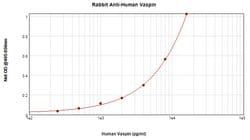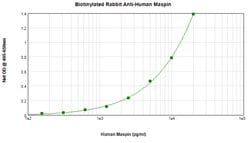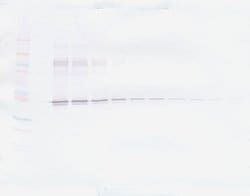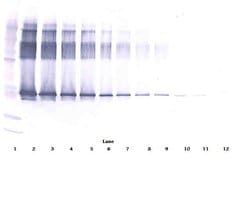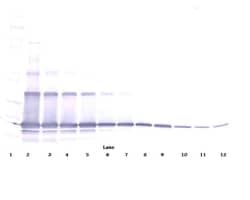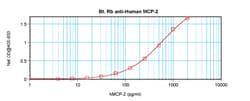Serpina12 Polyclonal Antibody, Biotin, PeproTech®, Invitrogen™
Rabbit Polyclonal Antibody
Manufacturer: Fischer Scientific
The price for this product is unavailable. Please request a quote
Antigen
Serpina12
Applications
ELISA, Western Blot
Conjugate
Biotin
Host Species
Rabbit
Target Species
Human
Gene Accession No.
Q8IW75
Gene ID (Entrez)
145264
Immunogen
E.coli-derived, 45.2 kDa Recombinant Human Vaspin
Purification Method
Antigen affinity chromatography
Gene
SERPINA12
Concentration
0.1-1.0 mg/mL
Classification
Polyclonal
Form
Lyophilized
Regulatory Status
RUO
Formulation
PBS with no preservative
Gene Alias
4632419J12Rik; a12; Ol64; Ol-64; serine (or cysteine) peptidase inhibitor, clade A (alpha-1 antiproteinase, antitrypsin), member 12; serine (or cysteine) peptidase inhibitor, clade A, member 12; serine (or cysteine) proteinase inhibitor, clade A (alpha-1 antiproteinase, antitrypsin), member 12; serpin A12; serpin family A member 12; serpin peptidase inhibitor, clade A (alpha-1 antiproteinase, antitrypsin), member 12; serpin peptidase inhibitor, clade A, member 12; Serpina12; Vaspin; visceral adipose tissue-derived serine protease inhibitor; visceral adipose tissue-derived serpin; visceral adipose-specific serpin
Gene Symbols
SERPINA12
Primary or Secondary
Primary
Content And Storage
-20°C
Description
- AA Sequence of recombinant protein: MLKPSFSPRN YKALSEVQGW KQRMAAKELA RQNMDLGFKL LKKLAFYNPG RNIFLSPLSI STAFSMLCLG AQDSTLDEIK QGFNFRKMPE KDLHEGFHYI IHELTQKTQD LKLSIGNTLF IDQRLQPQRK FLEDAKNFYS AETILTNFQN LEMAQKQIND FISQKTHGKI NNLIENIDPG TVMLLANYIF FRARWKHEFD PNVTKEEDFF LEKNSSVKVP MMFRSGIYQV GYDDKLSCTI LEIPYQKNIT AIFILPDEGK LKHLEKGLQV DTFSRWKTLL SRRVVDVSVP RLHMTGTFDL KKTLSYIGVS KIFEEHGDLT KIAPHRSLKV GEAVHKAELK MDERGTEGAA GTGAQTLPME TPLVVKIDKP YLLLIYSEKI PSVLFLGKIV NPIGK
- Preparation: Produced from sera of rabbits immunized with highly pure Recombinant Human Vaspin
- Anti-Human Vaspin-specific antibody was purified by affinity chromatography and then biotinylated
- Sandwich ELISA: To detect hVaspin by sandwich ELISA (using 100 μL/well antibody solution) a concentration of 0.25-1.0 μg/mL of this antibody is required
- This biotinylated polyclonal antibody, in conjunction with PeproTech Polyclonal Anti-Human Vaspin (500-P256) as a capture antibody, allows the detection of at least 0.2-0.4 ng/well of Recombinant hVaspin
- Western Blot: To detect hVaspin by Western Blot analysis this antibody can be used at a concentration of 0.1-0.2 μg/mL
- Used in conjunction with compatible secondary reagents the detection limit for Recombinant hVaspin is 1.5-3.0 ng/lane, under either reducing or non-reducing conditions
- 500-P256BT-1MG will be provided as 2 x 500 μg Vaspin is a newly described adipocytokine expressed predominantly in visceral white adipose tissues
- Structure analysis of vaspin predicts the presence of three beta-sheets, nine alpha-helices, and one central loop, which are distinctive structural features of Serpin family members
- The serpins are irreversible ("esuicidal"e) serine-protease inhibitors, characterized by having more than 30% sequence homology with alpha1-antitrypsin and a conserved tertiary structure, which contains an exposed reactive center loop that acts as a pseudo-substrate for the target proteinase
- Members of this family play an important role in a number of fundamental biological processes, including blood coagulation, fibrinolysis, complement activation, angiogenesis, inflammation, and tumor suppression
- In humans, the serpins represent approximately 2% of total serum proteins, of which 70% is alpha1-antitrypsin
- Vaspin exhibits 40.2% sequence identity with alpha1-antitrypsin
- Yet, its protease inhibitory activity is still unknown
- Vaspin mRNA expression in visceral fat is positively correlated with BMI and percent of body fat
- Administration of vaspin to obese mice improved glucose tolerance and insulin sensitivity, reflected by normalized blood glucose levels
- It also led to the reversal of altered expression of diabetes-relevant adipocytokines, including leptin, adiponectin, resistin, and TNF-alpha
- These findings suggest a potential clinical use for Vaspin in ameliorating certain aberrations seen in the diabetic/obesity metabolic syndrome.
